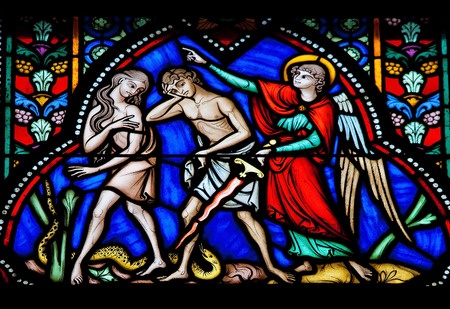Annual rituals invite us to do the same things the same way, every time. How else can we maintain the traditions? Holy Week is no exception. Perhaps it should be.
This year, I invite us to do several things differently. With little effort, we can make this our best Good Friday yet—because this time, we could move closer to God than we’ve ever been. Here are four ways we can do that:
1. Render unto God only things that are godly.
 What images do the words “God” and “godly” evoke for you? Do you see a gigantic male who lives in the farthest reaches of outer space, and sees every living being and blade of grass? Are His judgements harsh and His punishments extreme? Have you ever wished his angry vengeance upon someone who’s done something really horrible? Are certain acts unforgivable for Him? Does He favor some of us over others? Does He not love some humans?
What images do the words “God” and “godly” evoke for you? Do you see a gigantic male who lives in the farthest reaches of outer space, and sees every living being and blade of grass? Are His judgements harsh and His punishments extreme? Have you ever wished his angry vengeance upon someone who’s done something really horrible? Are certain acts unforgivable for Him? Does He favor some of us over others? Does He not love some humans?
If you answered yes to any of those questions, you probably are God-fearing.
But do you also trust God in times of need? Does He occasionally grant your prayer requests and shower you with blessings? Do you believe that today, what has come to be known as Good Friday, is God’s greatest blessing of all? Do you celebrate the day “God so loved the world that He gave His only begotten Son, that whosoever believeth in Him shall not perish but have everlasting life”?
In plain-speak, this well-known verse means this: God loved His sinful children so much that He gave His only sinless son to the barbaric Roman soldiers as a scapegoat to be slowly tortured to death so that sinners are saved from God’s sadistic punishment for their own wrongdoing.
For most of our lives, we have clung to the belief that God behaves like a demon. But we also declare that God is good all the time. It is either one or the other. We have choices to make, Sweet Souls. May I offer some options:
We can consider the possibility that what we fear about God is based on “alternative facts.”
We can proclaim that injustice is not godly. It is not fair to shift the responsibility for Adam’s hapless mistake to every living human at their birth, or to shift the responsibility for every living human’s mistakes to Jesus upon his death.
We can defend God’s divine essence, instead of defending ourselves against what we believe is God’s wrath-filled violence.
We can stop cowering in fear at the thought of being in God’s presence, and start cuddling.
We have rendered unto God things that are wholly ungodly, and indisputably unholy. We fervently believe that a savior must protect us from God’s crimes against humanity, and we want others to believe it, too. We have relentlessly demonized God and we can make it right this Good Friday.
2. Do unto Jesus what you’d want done to you.
We play word games to obfuscate the heinous nature of Jesus’s death and exonerate ourselves from any responsibility for it. We love to say Jesus “died” for our sins. Let’s be clear: According to three gospel authors, Jesus was crucified—slowly and sadistically tortured to death as a criminal—even though he had done nothing wrong. For that, we thank God.
Really? We wouldn’t be grateful if any other loved one was murdered for something we did. We wouldn’t wear a symbol of the killer’s murder weapon around our necks, hang it in our homes, places of worship or from our rear view mirrors. Why do we make an exception for Jesus?
Are we so tone deaf that we can’t hear ourselves shout, “Better thee than me, Jesus!” We loudly and proudly thank God for washing us in Jesus’s blood, seemingly oblivious that this bloodbath is part of a satanic ritual.
Every open eye can see that the entire crucifixion drama is based on one premise: The appropriate and divine response to human error is heartless banishment, genocide by flood or sadistic torture.
Why on Earth do we want to believe God is so brutally unforgiving? And why do we believe Jesus is mentally ill? Let’s face it, if anyone else volunteered to be slowly tortured to death for crimes others committed, we’d call him a masochist. But if it’s Jesus, we call him our “savior.”
We must own our beliefs. No one can force us to believe anything we against our will. We choose our beliefs and values. We choose whether it is good to be angry and vengeful. We choose whether it is fair for someone to suffer for the wrongs of others. We choose whether it is right or wrong for someone we love to be brutally tortured to death—and whether Jesus’s murder or the murder of any member of the human family warrants praise and thanksgiving. We also choose what kind of god to worship.
Conceivably, the primary reason we have such a distant and strained relationship with God is because we don’t know God. We don’t want to believe God is divine—and as God’s offspring, so are we.
We choose to believe implausible and horrific tales about what God is and what God does. It’s because we believe before thinking. As a result, not only do our beliefs disparage God, they force us to do nonsensical things: We run to a genocidal maniac to ask for a blessing, a healing, a lover. Or a lottery number.
Holding God in higher regard could significantly improve our relationship with the Divine. If we want to know God more intimately, we can start this Good Friday by treating Jesus the way we’d want to be treated. We could resist demands to be grateful he was allegedly murdered for something we did.
3. Learn a little ancient history.
Intellectual curiosity is often discouraged in religious circles. Sometimes we are even threatened when we question beliefs that others cram into our heads and ram down our throats. We’re told to just “have faith,” as if doing so will miraculously transform the implausible into the actual. If we don’t have faith, they say, we offend God. We are not believers; we are heathens.
Contrary to what some command us to believe, knowledge is not a sin. And neither is reading. They prefer to read to us what they want us to know. In our ignorance, many of us believe Jesus not only was Christian, he founded the Christian Church. If we read for ourselves, we’d know he was born Jewish, and remained so until he was crowned “King of the Jews” by the Roman soldiers who crucified him. We’d also know the Church wasn’t established until more than 300 years after his murder.
Reading also reveals that the cross was not created as a symbol of Christianity; it harkens back to the Bronze Age, thousands of years before Jesus was born. We’d also discover that Jesus’s life story precedes his time on Earth by many centuries. Wait. What?
Ancient mythology has told and retold this narrative many times. At least five sons of gods predated Jesus by centuries. Each had a father who was a god, their mothers were human virgins, they healed the sick and raised the dead, they were murdered by the establishment and all rose on the third day. In order of appearance: Horus of Egypt (c. 3000 BC), Mithra of Persia (c. 1200 BC), Attis of Greece (c. 1200 BC), Krishna of India (c. 900 BC) and Dionysus of Greece (c. 500 BC).
Don’t take my word for it. Read. What better day than today?
4. Forgive yourself this Good Friday.
Alexander Pope famously wrote, “To err is human, to forgive divine.” He apparently believed God is forgiving. Yea!
Perhaps humans don’t forgive freely because we believe God doesn’t. Our belief that God opted to banish Adam and Eve, drown almost every living thing on Earth—even the animals and plants—and brutalize Jesus rather than forgive wrongdoing has a powerful influence over our willingness to forgive.
Forgiveness is powerful, transformative and liberating. It is an exercise we need this day, perhaps more than any other. Instead of modeling our behavior after that of an angry vengeful God, we could mirror the father in Jesus’s Prodigal Son parable. Jesus portrayed God as an unconditionally forgiving father who enthusiastically showers his wayward and disrespectful offspring with love and care, upon his awkward return home.
Who are we going to forgive first? How about starting with ourselves? We made a conscious decision to believe that God planned Jesus’s horrific murder, and that Jesus thought that was a splendid idea. We set aside the implausibility of any soul wanting to come to Earth to be sadistically tortured to death, and refused to ask even one common sense question:
If Jesus agreed to come to Earth to be slowly tortured to death for the wrongs of others, why would he say of his murderers, “Father, forgive them, for they do not know what they are doing”?
Because we didn’t ask that simple question, naturally the follow-ups were never asked:
1. If Jesus was nailed to the cross solely because God wouldn’t forgive, wouldn’t he know his plea of forgiveness would fall on deaf ears?
2. Since the Roman soldiers were fulfilling God’s and Jesus’s plan, why would the soldiers need to be forgiven?
3. If Jesus was knowingly fulfilling his destiny, why did he reportedly cry out, “My God, my God, why hast thou forsaken me?”
We blindly believe that Good Friday is part of human history—and that it is a holy day. Perhaps it is time to exonerate God and fully pardon ourselves for the criminal accusations we’ve made and evangelized, based on the claim that God solves problems by killing His children, one at a time or en masse.
In 325 AD, when the Emperor Constantine and a gathering of clergy selected the books to included the Judeo-Christian Bible, it is clear how they wanted God’s image to be embedded into the human consciousness. It is just as clear what they didn’t want us to believe.
The chosen Gospel of Mark contains the initial birth and death narratives that were later mirrored in the chosen gospels of Matthew and Luke. They neither knew Jesus nor were his contemporaries. Curiously, the Gospel of Thomas, written by one of Jesus’s disciples, was not selected for inclusion.
Thomas’s book makes no mention of a crucifixion or resurrection—and he was there. Instead, his book focuses on what is really important about Jesus’s life: His wisdom and his lessons. Among Jesus’s sayings:
“If those who lead you say to you, ‘look, the Kingdom is in the sky,’ then the birds will get there first. If they say ‘it’s in the ocean,’ then the fish will get there first. But the Kingdom of God is within you and outside of you. Once you come to know yourselves, you will become known. And you will know that it is you who are the children of the living father.”
This Good Friday offers an opportunity for us to think evolutionary and enlightening thoughts about who we are, and who God is. It is a chance to forgive ourselves for perceiving God as somewhere rather than everywhere, and demonic rather than divine.
It’s the perfect occasion to grab a hefty supply of free Forgiveness Coupons. They’ve been in popular demand on the site since 2006. Stock up, share freely. Spread the love. Change a life.
May your decision to believe that you are a child of the divine and life-affirming God make this your best Good Friday yet.
I love you!











 We Christians call this Friday “Good;” but it’s the most heartbreaking day on my calendar. It marks the day when we refresh the accusation that God loved His guilty kids so much that He had His only innocent child brutally tortured to death, effectively letting the others off the hook.
We Christians call this Friday “Good;” but it’s the most heartbreaking day on my calendar. It marks the day when we refresh the accusation that God loved His guilty kids so much that He had His only innocent child brutally tortured to death, effectively letting the others off the hook. According to the Associated Press, the revelation was unveiled in
According to the Associated Press, the revelation was unveiled in 